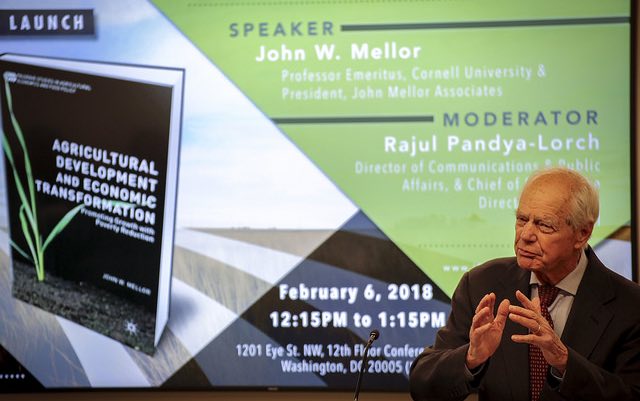Fifty years after publishing his first book, John W. Mellor, professor emeritus of international economics, Cornell University and now president of John Mellor Associates, recently returned to IFPRI, where he served as the founding director general from 1976 to 1990, to share insights from his new book, Agricultural Development and Economic Transformation: Promoting Growth with Poverty Reduction.
“The core of modernization is investment in agricultural research,” said Mellor, reflecting on the many lessons learned since the beginning of his career. Focusing primarily on Africa, Mellor explained that many African countries do not have proper agricultural extension systems that research farmers’ problems and support best practices and the adoption of new technologies.
Building such systems requires commitment from political leaders. “You cannot develop agriculture in a low-income country unless you have a clear plan backed by the prime minister,” Mellor said, adding that crafting such plans is a challenge that itself requires support, while “foreign aid in general is not in favor of planning.”
Mellor shared seven key observations on how the development of agriculture in low and medium income countries can transform economies, and obstacles to that goal:
- Modernizing agriculture increases both labor productivity and the quantity of farm family labor.
- In low income countries, cereal prices do not decline with rapid growth, and small commercial farmers spend more income in the rural nonfarm sector, leading to more cereal consumption there—and a marked rise in food security.
- Farmer’s wives tend to lose influence over farm operations with modernization, marginalizing an important source of knowledge and expertise.
- Countries do not spend enough on agricultural research.
- Many countries lack a specialized finance agency to address the special needs of agriculture.
- Middle income countries are lagging in agricultural growth because they are not focusing on rising demand for livestock and high-value horticultural products.
- Governments, from the prime minister down, must make a strong commitment to strategic planning for agricultural development.
“It is very important to me that Africa succeeds,” Mellor concluded, explaining that he still wants to write the final book on how it did so. At 90 years old, he added that he does not have much time left to conduct research—“so I want them to hurry up!”
Katarlah Taylor is an IFPRI Senior Events Specialist.







